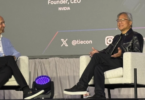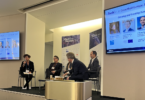Viva Technology 2019, which attracted more than 100,000 attendees to Paris for its fourth edition, including entrepreneurs ,France’s biggest corporations and top policy makers, highlighted how technology is expected to continue to disrupt markets and people’s daily lives.
At its heart, the theme and goals of the show are to showcase key technologies such as artificial intelligence and the ways big, traditional businesses such as LVMH, Accor, L’Oreal, Sanofi and EDF are trying to transform themselves alongside the startups that want to disrupt them.
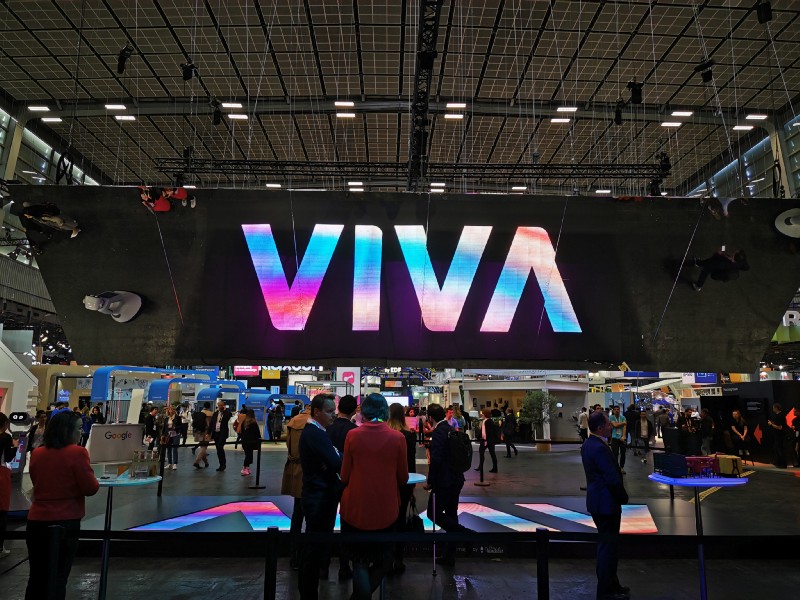
VivaTech has also become a platform for France itself. It’s a chance to convince an international crowd to spend time in the country and potentially set up business here. This year, there were 20 country pavilions, including Germany, Spain, the United Kingdom, and Switzerland. And China’s presence continues to grow, with Huawei on board as a major partner, and appearances on the mainstage by Alibaba’s Jack Ma, Huawei Chairman Ken Hu and Kai-Fu Lee, the ex-head of Google China and founder of Beijing-based venture firm Sinovation Ventures.
ARTIFICIAL INTELLIGENCE
Artificial intelligence was the most discussed and debated technology at VivaTech this year.
The battle for dominance in artificial intelligence is expected to impact economic supremacy, defense and social stability. Getting it right could have enormous benefits. For example, it’s estimated that developing and diffusing AI could add up to €2.7 trillion to European economic output by 2030, according to a report by the World Economic Forum and McKinsey.
Frenchman Yann LeCun, Facebook’s chief scientist, said Europe has the most critical element in place. “France in particular, and Europe in general, have very good educational systems, and so they have some very good talent,” LeCun said during an onstage session at VivaTech. “And that’s the most difficult thing to build if you don’t have it.”
However, LeCun said one of the big shortcomings remained the big corporations. Compared to the U.S. and China, LeCun said French companies are not investing enough in long-term digital research. “There is no long-term research in IT in France,” he said.
LeCun also cautioned that when it comes to AI and ethics, it’s important to remember that there is more than one viewpoint when defining “good” and “bad.” As an example, he pointed to the debate of AI-driven facial recognition services in China. People in the West seemed horrified by the vision of AI creating a surveillance state. But in China, there is not the same anxiety. “The Chinese population finds that kind of normal,” LeCun said. “They find it increases security.”
Former chess champion Garry Kasparov, now an ambassador for security company Avast, argued that technology itself is neutral. How people use it is more reflective on long-standing human weaknesses. “It’s not about AI being evil,” Kasparov said. “It’s about humans.”
Lee, the former head of Google China, emphasized how artificial intelligence will boost productivity growth, raising prosperity and replacing mundane or dangerous tasks. It has the potential to do good across a wide range of domains, from healthcare to education, he said during a speech at VivaTech.
In his book “AI Superpowers: China, Silicon Valley and The New World Order” Lee famously argues that the AI race will have two winners: China and the U.S. If Europe wants a seat at the table it will have to learn to act as a single market and help its companies to scale more quickly, Lee said during a session entitled “Private Companies, Public Good” moderated by The Innovator .
The session discussed the role of government in balancing the need for speed with ensuring that AI is used for good. Panelists Francoise Soulie-Fogelman, who has more than 40 years experience in AI in both industry and academia, said it it is crucial that the technology is adopted in Europe in ways that protect democracy and data privacy.
In a different session Alibaba founder Jack Ma was openly dismissive of all the hand-wringing over AI’s potential dangers, particularly in Europe. He explained that Alibaba was deploying AI on a massive scale across its platform to root out fraud and scams. Only AI would allow the company to operate safely at such a size, he said. “I worry about Europe,” he said. “I worry about the worries of Europe. You worry, ‘Oh, we don’t have the solution for artificial intelligence! Oh, it’s going to destroy jobs! Let me tell you about artificial intelligence. We are using it to catch bad guys. We are teaching machines to catch the thieves…If you see the tech revolution as a problem, I’m sorry to say the problem has just started. If you see it as an opportunity, it’s also just started. The only difference is your mindset. If your mindset is worried, then you’re going to worry all the time.”
CAN DIGITAL EUROPE COMPETE?
The question now is whether Europe can leverage the new wave of digital or digitally enabled technologies to create new jobs and new types of products and services. This year, VivaTech embraced the theme of United Tech of Europe to encourage more cooperation and highlight the progress that is being made. To that end VivaTech for the first time hosted a competition called the “Next European Unicorn Awards.” Currently, CB Insights counts 30 unicorns in Europe of the 265 globally. The grand prize went to France’s Openclassrooms, an online professional training platform. The other winners included: U.K.-based Olio, an app dedicated to fight against waste, in the Tech for Good category; France’s Payfit, an integrated payroll and HR management platform in the B2B For SME category; U.K.-based Snyk, a developer’s platform, in the B2B Enterprise category; Lithuania’s Vinted, an online used-clothing marketplace, for the BtoC category; and France’s Algolia, a third-party search engine service, for the Deep Tech category.
Despite progress, big challenges remain. Speaking on stage, Klaus Hommels, founder of investment firm Lakestar, a Zurich-based investment firm with offices in Berlin, London, New York and Hong Kong, said European startups are still struggling to make a bigger impact globally. In part, he attributes that to the smaller venture capital community in Europe. And he argued that governments and public agencies are still not investing enough in technology and startups. The combination still forces too many of these companies to move abroad in search of funding as they grow, he said.
Europe is also failing to develop and attract enough talent to fill tech-related jobs. Frédéric Mazzella, CEO of carpooling unicorn BlaBlaCar, said he is optimistic Europe can close the gap. But he said the lack of harmonization between work and investment rules across the Continent was still a big barrier to companies scaling quickly. “You have to recreate the environment each time, because you have different taxes, different rules depending the country,” he said.
In an interview on stage with The Innovator, Flora Coleman, Head of Government Affairs at fintech unicorn TransferWise, noted in particular that the lack of harmony for rules around stock options made it extremely difficult for fast-moving startups to expand across Europe. TransferWise is part of a group of startups and venture capitalists who have joined an effort led by Index Venture to lobby for greater unity around these rules to make Europe more competitive with Silicon Valley.
There are some positive signs. One area where Europe has clearly taken a big lead is fintech. And Coleman said that has been helped by smart regulation and rules that have, if not been completely harmonized, evolved close enough to ease the road for startups. Europe has a single market for banking licenses. That and new rules — such as one enabling digital “know your customer” verification, has paved the way for a number of digital challenger banks. Coleman said the push by governments to create regulatory sandboxes, and to require greater transparency, are prime examples of how Europe’s regulatory philosophy can encourage innovation.
But Europe came in for some sharp criticism from Alibaba’s Ma. The Chinese entrepreneur said he hears European’s constantly complaining about disruption and being afraid of the future. As a result, he said the continent was too quick to turn to politicians to protect them. “In China, we have not regulated the internet,” Ma said, though this seemed to ignore the fact that his country places heavy restrictions around online activities that have prevented U.S. companies like Facebook, Google, and Twitter from operating there.
“In Europe, I have the impression that you only know how to regulate and legislate,” Ma continued. “When you have a problem, you draft laws… We should spend more time to think about how these policies could change the future! You can’t do anything about yesterday, so few things about today, but a minor change in the present can have major effects on the future. Policies have to be smart, and we must create them only by considering their long-term effects.”
Margrethe Vestager, EU Competition Commissioner, defended Europe’s approach. The goal, she said, was not to protect incumbents, but rather to ensure a level playing field that would allow for newcomers and giants to compete fairly.
“Competition is the main driver of innovation,” Vestager said. “If you have someone challenging you, you always get better. That’s why we always want to protect competition inside Europe and we don’t want to create monopolies with an unregulated market.”
During French President Emmanuel Macron’s appearance at VivaTech, he emphasized the need for greater European cooperation and integration. It’s a point of view that has often left him isolated in an era when Brexit and rising populism have given rise to forces that seem to be pulling European nations apart. Macron said if that continues to play out, Europe would have lots of national and regional tech ecosystems that would be far less effective.
“That’s exactly why we do need an integrated European Union market and that’s something on what we work extremely hard with my team and others European governments,” Macron said. “It will help us to build regulations equal for all, included Chinese and Americans competitors.”
TURNING FRANCE INTO A STARTUP NATION
The summit and VivaTech have also become a way for Macron to promote entrepreneurship while lobbying big tech companies to invest in France. That requires a bit of tightrope walking as Macron also tries to remain firm on issues like paying taxes and work rules. For instance, following a meeting with Uber CEO Dara Khosrowshahi, Macron announced an agreement to develop some experimental ridesharing services while also insisting the company needed to follow France’s rules. Uber said it would start a pilot project with Paris public transportation agency RATP to find ways to connect ride hailing and public transport services, as well as facilitating Uber drivers who want to apply for more permanent jobs with RATP. The French government is pressing for gig workers such as Uber drivers to be considered employees, and to make it easier for them to switch jobs to competitors.
On the opening day of VivaTech, Macron took to the main stage with an unusual format: A handful of entrepreneurs were selected to “interview” him. During the session, Macron insisted the country was not interested in protectionism, but rather is striving for fairness in taxation and rules. The country is still looking a tax reforms to encourage investment in startups, he said.
For the past five years, France has been trying to catalyze its startup ecosystem in order to jumpstart a stagnant economy. Operating under the umbrells of “La French Tech,” these efforts have paid some clear dividends. Since 2014, French startups have raised $12.84 billion across 2,734 deals, according to CB Insights. That includes $1.16 billion raised in just the first three months of 2019, putting the country on pace to top last year’s total of $3.4 billion by $1 billion.
That puts France second in fundraising for European countries, just ahead of Germany, yet still far behind the U.K. However, one of the big focuses for France has been the effort to attract more later-stage funding for so-called “scale-ups.” French entrepreneurs have more access to seed and early-stage funding now, but still tend to leave in search of later-stage funding in places like London or the U.S. The French government has set of goal of having 20 unicorns by 2025. It currently has four while the U.K. has 16, China has 90 and the U.S. has 165.
“Four years ago, we were already the best in Western Europe in creating startups, but we had trouble scaling,” Macron proclaimed during his appearance on the first day of VivaTech. “Today, the tickets are getting bigger and bigger, there is an acceleration of the ecosystem.”
Indeed, since the start of this year, online doctor booking site Doctolib raised a $170 million round; Wynd raised $82 million; Mirakl raised $70 million; Shift Technology raised $60 million; and ContentSquare raised $60 million. Klaxoon, which has raised $55 million in venture capital for its business meeting and training platform, had its own sizable booth at VivaTech. And Meero, a startup that uses AI to process images and video which has raised $64 million, also had a big presence at the conference.
The French government is trying to find other ways to boost its homegrown startups. At the show privacy-based search Qwant announced a partnership with Microsoft to use its Azure platform to improve the performance of its platform. Qwant executives had previously been critical of Microsoft’s rival Bing search engine, as well as the privacy practices of U.S. and Chinese Internet giants. And, following that announcement on stage at VivaTech, Digital Minister Cedric O revealed that the French government would begin using Qwant exclusively.
Getting traditional companies involved in the digital economy remains a priority for the government. It is vital for these companies to become a source of investment in startups and exits to help these big brands from being disrupted by overseas upstarts.
To that end VivaTech’s Open Innovation Lab program encourages participating large companies to create startup competitions to help them address market challenges and understand new business models.
VivaTech officials said more than 10,000 startups applies to the Open Innovation program. Some 57% were from outside France.
During the first two days of the conference large corporates hosted pitch contests. For example, LVMH announced that Silicon Valley startup 3DLOOK, which makes mobile body scanning technology for retailers, won the LVMH Innovation Award. The recognition comes with the promise of “personalized support” from LVMH as part of its incubator based as startup campus Station F.
While it is clear that French corporates are doing more in this space according to CB Insights the amount being invested by French corporates in startups fell 8% in the first quarter of 2019 from the same period a year ago.
TECH FOR GOOD
In terms of pitching France to the world, one of the most significant branding efforts is “Tech for Good.” Strategically, the country wants to position itself as more humanistic and socially-aware than Silicon Valley, while also more open and transparent than China’s centralized, surveillance-enabled approach to tech.
In defining this approach, the annual Tech for Good summit encompasses a dizzying array of topics related to the way technology is shaping the world, for good and for bad, who is benefiting, and who is getting left behind. The emerging approaches have involved proscriptive regulations, volunteer agreements with for-profit companies, investments by corporates in programs designed to address these imbalances, and debates around the ethics of emerging technologies.
On the eve of VivaTech, the second annual Tech For Good summit once again attracted an A-list of tech CEOs and high-level executives from companies such as Twitter, Uber, IBM, Facebook, Microsoft, and Amazon as well as heads of state, including Canadian Prime Minister Justin Trudeau and New Zealand Prime Minister Jacinda Ardern. Ardern gained international attention for her strong yet compassionate response to the shootings in Christchurch at two mosques that left 51 people dead. The live broadcast of that by the shooter, and the inability of tech companies to stop it from spreading around the world, prompted a call to to stop social media from being exploited by extremists.
The result was an agreement signed in Paris by governments and tech companies called the “Christchurch Call.” The accord lays out a framework for ways governments and tech companies will work together to fight such malicious content. The gathering and the press conference at the end of the day with Ardern made global headlines. “What happened in Christchurch was not just another terrorist attack,” Macron said. “It was someone taking the power of the Internet and transforming into this machine for spreading crazy propaganda.”
In addition to the Christchurch Call, the summit produced an agreement signed by 45 tech and non-tech companies to double the number of women in management positions from 15% to 30% by 2022. Those signing included Alibaba, BNP Paribas, Booking.com, IBM, L’Oreal and Uber.
The opening day of VivaTech also saw a number of high-profile CEOs weighing in. “The best way to do Tech For Good is to involve users so that they have a right and a way to express themselves to build their future and that of their world,” said Sohn Young, president of Samsung.
IBM CEO Ginni Rometty warned that more must be done to prepare societies in the years ahead for even more fundamental disruptions. Corporations in particular have a special responsibility to get this right. “Being trusted also means that you must prepare the society to work with your technologies,” she said during her keynote. “I personally believe we have to adopt some new paradigms and think about new ways to get and provide people with a good life.”
Indeed, a report by the McKinsey Global Institute called “Tech For Good: Smoothing disruption, improving well-being,” highlights a broad number of ways that society will potentially benefit from technologies such as automation and artificial intelligence. Greater efficiency will lead to lower costs that will make a greater range of products available to more people, says the report. That will also eventually create new jobs. But along the way, the authors note that there will be large waves of displacement, with at least 75 million people needing to change occupation by 2030.
“The development and adoption of advanced technologies including smart automation and artificial intelligence has the potential not only to raise productivity and GDP growth but also to improve well-being more broadly, including through healthier life and longevity and more leisure,” the report says. “Alongside such benefits, these technologies also have the potential to reduce disruption and the potentially destabilizing effects on society arising from their adoption.”
To achieve this result business leaders will need to understand and be convinced of the argument that “proactive management of technology transitions is not only in the interest of society at large but also in the more narrowly focused financial interest of companies themselves,” says the report. And, it says, the public-sector needs to help by supporting R &D and innovation; creating markets for public goods, such as health, so there is a business incentive to serve those markets, and by collaborating with businesses on reskilling and worker matching.
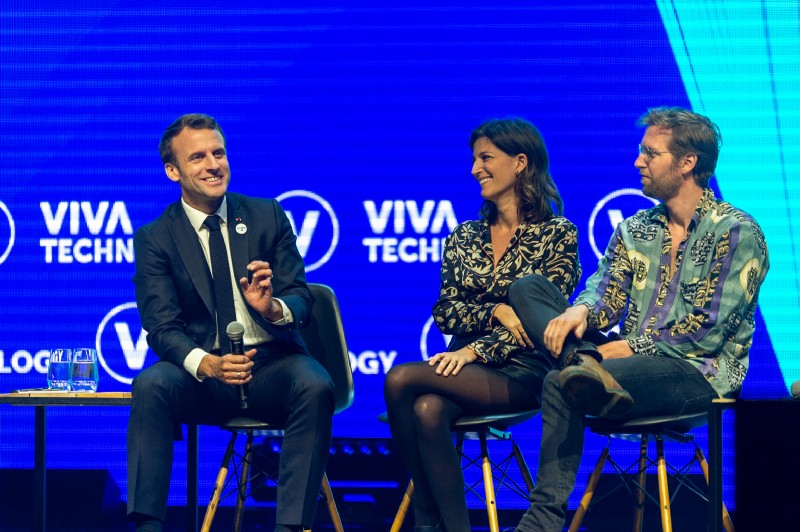 French President Emmanuel Macron on stage at Viva Technology
French President Emmanuel Macron on stage at Viva Technology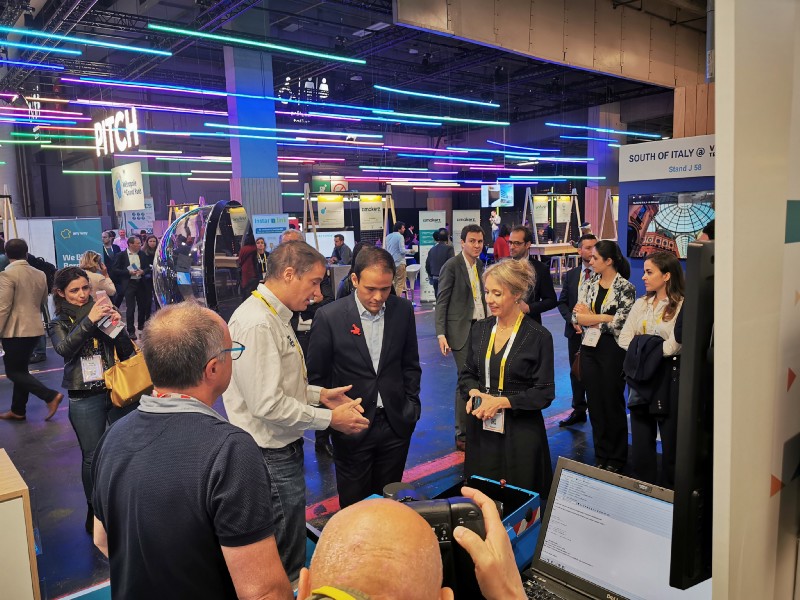 Cedric O, France’s New Minister For Digital Technologies, Visits a VivaTech booth
Cedric O, France’s New Minister For Digital Technologies, Visits a VivaTech booth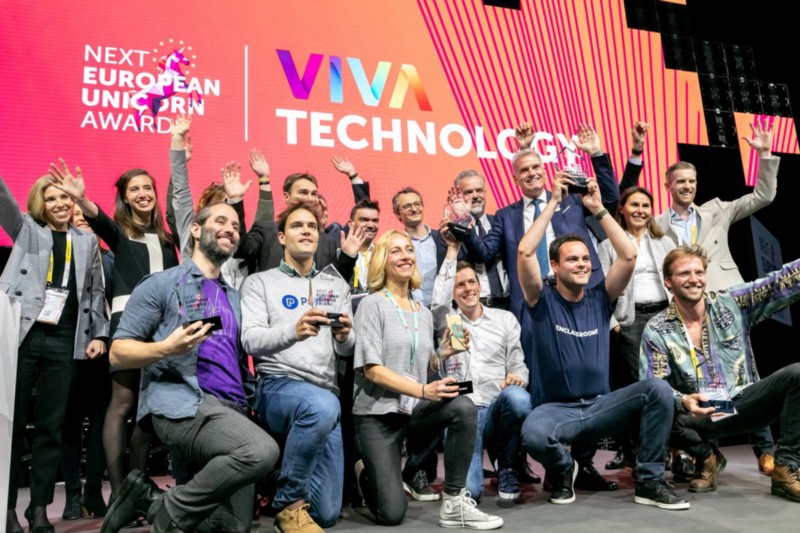 Finalists in VivaTech’s Next European Unicorn awards
Finalists in VivaTech’s Next European Unicorn awards L’Oreal displays a virtual hair advisor
L’Oreal displays a virtual hair advisor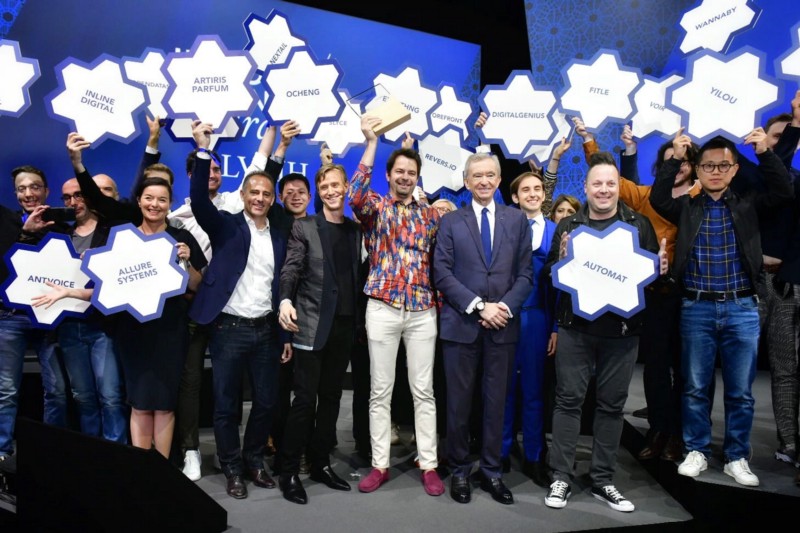 LVMH announces the winner of its innovation awards
LVMH announces the winner of its innovation awards

